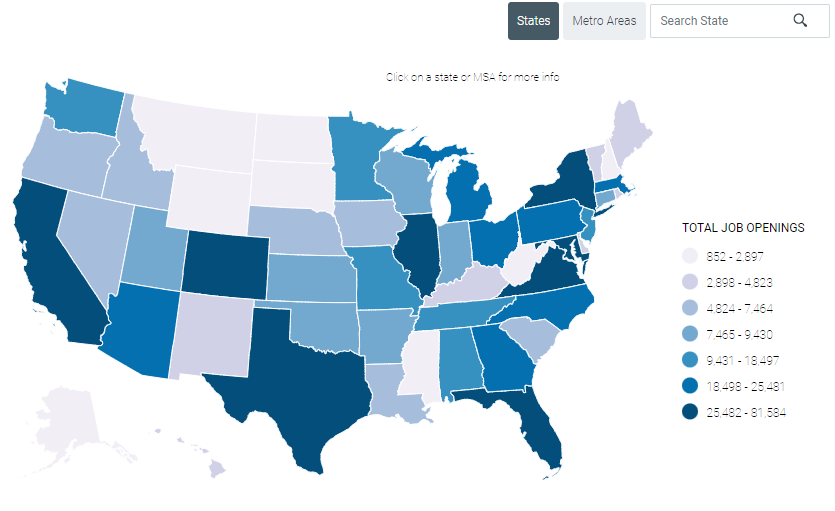Published by Acadeum on Apr 4, 2023 2:38:42 PM
There is a tremendous demand for cyber talent, which shows no signs of letting up. A news release from CyberSeek in 2022 referenced 770,000 job postings in the previous 12-month period, as demand for cyber workers grew 2.4x faster than the overall job rate. This heat map provided by Seek provides a sense of the job demand for cyber security by states across the U.S.

Colleges and universities find themselves at the center of this workforce need, challenged to find solutions to meet the demand. As the higher education landscape shifts, it necessitates innovative responses to ensure students not only earn a degree but that those students also possess demonstrable skills to enter the workforce.
The difficulty in filling many of these open positions can be related to the industry requirement around credentials and certifications. Even with an undergrad or graduate degree in cybersecurity, computer science, or a similar field, that may not be substantial enough to land a job within the industry.
Power of the Acadeum Network: Enabling Institutions to Do Together What’s Challenging to Do Alone
How do colleges and universities meet that demand? Creating new programs and majors is often costly and laborious, while resourcing specialized faculty is challenging in the current environment. Colleges and universities are finding success by leveraging like-minded institutions through the Acadeum network.
The Acadeum network connects accredited institutions and programs to share courses taught by qualified faculty. Currently, 14 institutions are offering more than 57 cyber security-specific courses. This number does not count the more than 450 computer science courses and more than 50 Homeland Security courses offered throughout the entire network.
In addition, our teaching institutions include institutions named by the National Centers of Academic Excellence in cybersecurity from the National Security Agency. They provide hands-on coursework with lab simulations and the opportunity to obtain industry credentials and certifications to prepare students for the workforce.
Read on to learn how teaching institutions within the Acadeum network have successfully created programs and pathways leveraging in-demand courses and credentials to meet the workforce’s needs.
Bay Path University is the only women’s college in the nation that is a center of ACC Academic Excellence, offering a Bachelor of Science degree in cybersecurity with three concentrations, including Forensics, Incident Response, Information assurance, and Risk Management. Additionally, Bay Path works with Acadeum to offer micro-credentialing, mapping the IBM analyst certification to several of their courses.
The Academic Program Director for Cybersecurity at Bay Path University, Doug Keepers, said, “Leveraging these organizations that are building this content, rather than us having to go out and devise it on our own, has been very beneficial. We are preparing students for higher ability because it’s not just about the degree, it’s about the experience, it’s about the certification.” Earning a professional certification provides a valuable link between students and employers as students can demonstrate they are job ready when they leave their institution.
Bethel University maintains two tracks: an online cyber program aimed at adult students and a cyber concentration for traditional students. The programs prepare students for careers in finance and education, as well as private and public sectors. The concentration also gives traditional students the flexibility to decide if cyber is the career they want to pursue.
Cathy Bareiss notes the benefits of the concentration, saying that “for the traditional students, we let them take some of those as a concentration, considering that our traditional students are probably not ready to decide if they want to work in cyber for the rest of their life.” Bethel broadly prepares traditional students by combining the cyber concentration with the CS degree.
Franklin University offers a Bachelor of Science in Cybersecurity aligned with the NSA knowledge units and a Master’s in Cybersecurity. Franklin University’s unique program provides one of the few Bachelor’s of Cybersecurity with a registered apprenticeship while aligning with comp TIA certifications.
Dr. Jonathan McCombs, the co-founder of the Center for Public Safety and Cybersecurity Education, noted the internal partnership that benefits the cybersecurity program and students getting real-time experience. He said, “We have a team of learning designers and folks that help support the creation of courses alongside the faculty. I know that they have integrated net labs with all the coursework in the cybersecurity program so that students get real-time experience with the content and the problems associated with Cybersecurity.”
McKendree University has a program that takes a unique approach in offering a Bachelor of Business Administration in Cyber Defense. They deliver online courses while aligning with the National Initiative for Cybersecurity Education. The School of Business offers courses from a managerial perspective.
McKendree wants students who enter a career in banking, for example, to understand cybersecurity and succeed in banking. When Melissa Meeker, Dean of Worldwide Programs, reflected on why McKendree University decided to offer the courses from the business school, Melissa shared that it was a practical decision, “our School of Business was very excited about the opportunity and saw a great need. An added benefit is the school’s proximity to an air force base. The Air Force base employees aided in building the cyber security program, and it’s been a fantastic partnership for both organizations.”
McMurray University offers a Bachelor of Science in cybersecurity and aligns many classes with industry certifications. As the cybersecurity industry has a growing idea about the importance of certifications, McMurray has seen organizations accept certifications instead of a Bachelor of Science in Cyber degree.
So, when developing the program, they put the two together and created courses in alignment with the idea. As a result, they offer almost a dozen certifications as a CompTIA academic partner and a Cisco Networking Academy where students take courses.
Notre Dame College wants to empower students to enter the cybersecurity workforce. Matt Crowley, Assistant Professor, Cybersecurity Public Service, and Security Studies, says, “the program wants students to enter the workforce, and they encourage the instructors and students to consider an entry point that might be separate from a traditional cyber analyst pathway.”
The college teaches classes from a real-world perspective and then branches into areas of interest. In addition to the traditional analyst pathway, Notre Dame College opens doors for students to enter the workplace in other areas such as intelligence, public safety, and emergency management. Expanding the number of course offerings also broadens job market opportunities for students.
Incorporating the Acadeum Advantage
Through their partnerships with the Acadeum Network, each of the institutions highlighted experienced some critical advantages for creating and supplementing a cybersecurity program with the help of Acadeum.
Personalization: At Acadeum, we’re not creating a one size fits all curriculum for program sharing. Instead, your institution decides the exact courses and the number of core credits for your program. You determine the courses to staff and those to offer in partnership with a teaching institution in our network.
Flexibility: The Acadeum Network responds to the needs of each institution. Much like our other policies based on our consortium arrangements, articulation, or transfer, there’s no immediate investment involved in working together in the Acadeum network.
We offer sustainable options for challenges in higher education. Use the courses when needed as you build enrollment or are waiting to develop a particular size cohort. We can offer flexibility because of the breadth of what we bring together as the largest consortium and course-sharing network in higher education.
Partnership: We help create the right program for your institution. That partnership could facilitate a major, start a minor concentration certificate program, or even delve into graduate programs. There is also an opportunity to build agreements between institutions, so the network offers dependability and security that courses are there when you need them.
Your dedicated Acadeum partner success manager provides guidance as your institution answers the questions and considers the factors in developing a cybersecurity track. As established, the field of cybersecurity is growing, and the supply of qualified workers underperforms against the job openings demand. Organizations like the U.S. Bureau of Labor Statistics report that the jobs outlook from 2021-2031 is 35%, much faster than the national average.
At Acadeum, we recognize the need to help colleges and universities meet this demand. Acadeum expands what your institution can deliver by providing the infrastructure and the network to help you scale courses to meet needs in fields like cybersecurity.
Want to learn more about course sharing?
Download the Academic Leaders’ guide to course sharing.



